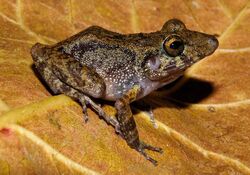Biology:Pristimantis gaigei
| Pristimantis gaigei | |
|---|---|

| |
| Scientific classification | |
| Domain: | Eukaryota |
| Kingdom: | Animalia |
| Phylum: | Chordata |
| Class: | Amphibia |
| Order: | Anura |
| Family: | Strabomantidae |
| Genus: | Pristimantis |
| Species: | P. gaigei
|
| Binomial name | |
| Pristimantis gaigei (Dunn, 1931)
| |
| Synonyms | |
| |
Pristimantis gaigei, also known as the Fort Randolph robber frog[2] or Gaige's rain frog,[3] is a species of frog in the family Strabomantidae. It is found in the Atlantic drainage lowlands from extreme south-eastern Costa Rica to eastern Panama and to central Colombia;[2] it is widely distributed in Colombia west of the Cordillera Oriental.[4] Its natural habitat is primary humid lowland forest, but it also occurs in secondary forest. It is a nocturnal species found under surface debris and in leaf-litter.[1]
Pristimantis gaigei is named after Helen Beulah Thompson Gaige, an American herpetologist.[5]
Description
The maximum snout–vent length attained by males is about 30 mm (1.2 in) and that of females about 43 mm (1.7 in).[6] The species is considered a mimic of poison dart frogs (Dendrobatidae): it has a pair of red, orange, or golden dorsolateral stripes, resembling toxic species Phyllobates aurotaenia and Phyllobates lugubris; some populations of Pristimantis gaigei are sympatric with these species.[3]
Reproduction
This species has axillary amplexus. No male advertisement call has been recorded and the species is presumed to have none. Clutch size in captivity has varied from 22 to 37 eggs measuring about 5 mm (0.20 in) in diameter each. Egg clutches were typically buried in the substrate or laid under cover. Hatching takes place after 28–39 days. Development is direct, and the newly hatched froglets were about 5 mm in length.[3]
References
- ↑ Jump up to: 1.0 1.1 IUCN SSC Amphibian Specialist Group (2020). "Pristimantis gaigei". IUCN Red List of Threatened Species 2020: e.T56609A3044236. doi:10.2305/IUCN.UK.2020-1.RLTS.T56609A3044236.en. https://www.iucnredlist.org/species/56609/3044236. Retrieved 16 November 2021.
- ↑ Jump up to: 2.0 2.1 Frost, Darrel R. (2022). "Pristimantis gaigei (Dunn, 1931)". Amphibian Species of the World: An Online Reference. Version 6.1. American Museum of Natural History. https://amphibiansoftheworld.amnh.org/Amphibia/Anura/Brachycephaloidea/Strabomantidae/Pristimantinae/Pristimantis/Pristimantis-gaigei.
- ↑ Jump up to: 3.0 3.1 3.2 Hill, R.; J. Kaylock; E. Griffith; H. Ross; R. Gagliardo; P. Crump (2010). "Observations on the captive reproduction of Gaige's Rain Frog, Pristimantis gaigeae". Herpetological Review 41 (1): 465–467.
- ↑ Acosta-Galvis, A.R. (2014). "Pristimantis gaigeae (Dunn, 1931)". Lista de los Anfibios de Colombia V.03.2014. www.batrachia.com. http://www.batrachia.com/orden-anura/craugastoridae/pristimantis-gaigeae/.
- ↑ Beolens, Bo; Watkins, Michael; Grayson, Michael (2013). The Eponym Dictionary of Amphibians. Exeter, England: Pelagic Publishing Ltd.. ISBN 978-1-907807-44-2. https://books.google.com/books?id=ZZY3BAAAQBAJ&q=eponym+dictionary+of+amphibians+gaige&pg=PT126.
- ↑ Luis Humberto Elizondo C.; Federico Bolaños V. (2011). "Pristimantis gaigeae". Biodiversidad de Costa Rica. Instituto Nacional de Biodiversidad. http://atta2.inbio.ac.cr/neoportal-web/species/pristimantis%20gaigeae.
Wikidata ☰ Q1592989 entry
 |


